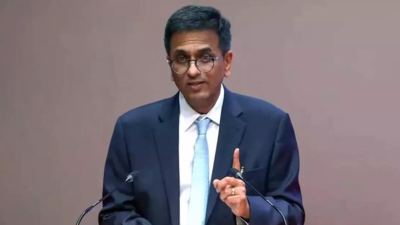‘Constitutional’: Ex-CJI Chandrachud backs simultaneous polls; flags one concern | India News

NEW DELHI: Former Chief Justice of India (CJI) DY Chandrachud has endorsed the constitutionality of the “one nation, one election” (ONOP) concept, ahead of his appearance before the joint parliamentary panel on simultaneous polls.Also Read: Govt targeting 2034 to hold 1st ‘one nation, one election’The ex-CJI, and another former chief justice, JS Khehar, are scheduled to appear before the committee later this week, on Friday.“The Constitution never mandated holding national and state elections separately,” Chandrachud mentioned in his opinion submitted to the Joint Committee of Parliament (JPC), headed by PP Chaudhary of the ruling Bharatiya Janata Party. This was Chandrachud’s response to the opposition’s criticism that the synchronisation of Lok Sabha and state assembly polls “violates” the Constitution’s basic structure.However, he questioned the “sweeping powers” proposed to be bestowed on the Election Commission to conduct simultaneous polls. The concern was previously raised by another former chief justice, Ranjan Gogoi.“Such unbounded authority could enable the poll body to curtail or extend the tenure of a state assembly beyond the constitutionally mandated five years, under the pretext that simultaneous elections with the Lok Sabha are not feasible. The Constitution must define, delineate and structure the circumstances under which the ECI may invoke this power,” Chandrachud, who was the country’s 50th chief justice from November 2022-2024, noted.“The Constitution must define, delineate and structure the circumstances under which the ECI may invoke this power,” he added.Another ex-CJI, UU Lalit, has also endorsed the constitutionality of the concept of ONOP. Gogoi and Lalit had presented their views before the JPC in February and March, respectively.‘ONOP won’t infringe upon voters’ right’Chandrachud also stated in his written opinion that simultaneous elections will not infringe upon the voters’ right to elect their representatives, and that the bill ensures that electors remain continuously represented by their duly elected members of Parliament or legislative assemblies.“Arguments opposing simultaneous elections are based on the premise that the Indian electorate is naive and can be easily manipulated. The argument that staggered elections are a part of the Constitution’s basic structure (or form part of the principles of federalism or democracy) does not hold. Staggered timing of elections cannot be considered as a feature of the original Constitution, let alone an immutable feature,” he said.However, his opinion is not without notes of caution over some of the bill’s features or the likely implications if it is to be enacted.For instance, Chandrachud has appeared to share the concern that simultaneous elections could “marginalise” smaller or regional parties due to the dominance of better-resourced national parties, saying it is a significant policy aspect that warrants legislative attention.While the Representation of the People Act, 1951 and the Conduct of Election Rules, 1961, impose ceilings on the amount a candidate may spend during the election campaign, there are no corresponding limits on the expenditure incurred by political parties themselves, he noted.This gap benefits parties with greater financial resources, he argued.As the bill says that the term of a House elected after a midterm poll will be only for the remainder of the five year term, Chandrachud has said the ability of the government to take any meaningful project will be “minimised” if its tenure is only of a year or less, as the Model Code of Conduct would come into force around six months before the next polls.Several JPC members have also raised this point about the likely priorities and strength of a government elected for a short period.





